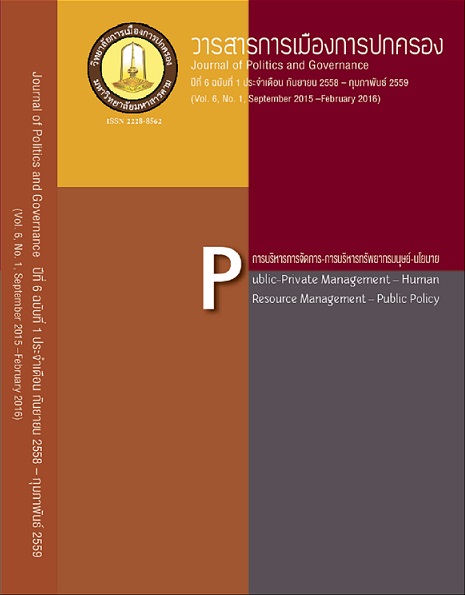The Policy Development of Social Capital to build up a Strong Community
Main Article Content
Abstract
The objectives of this study are to 1. To study the development of social capital to build stronger communities in Saraburi and Nakhon Nayok province. 2. To study the factors that influence the development of social capital to build stronger communities in Saraburi and Nakhon Nayok province. 3. To study proposes a method to improve the factors that influence the development of social capital to build stronger communities in Saraburi and Nakhon Nayok province. The quantitative research used the samples of 440 respondents. The research findings were as follows: The general states of the social capital development for strengthening 1) communities found that the levels of development in overall and 3 aspects are at high level. By the immune system to community development, social capital at the highest level is due. Social leaders play a key role in the implementation of social capital all public activities and encourage the community to have a sense of self-reliance contemplate joint decision-making and responsibility. In their own communities Part of the learning community is the lowest level that the officers acted in community learning centers also lack the knowledge to educate the public to enhance cognition and attention. 2) The social capital in the knowledge economy to build a strong community in Saraburi and Nakhon Nayok is ligh level. The level of statistical significance. 05. 3) The proposed guidelines for improvement the factors affecting the social capital development for strengthening communities composed the operation must be holistic approach depended on the primarily targets of sustainable development for self-reliance of community. The operation characterized networks creation and development of own members in communities all of process and steps for development should rely on the participation of communities.
Article Details
References
กฤษ อุตตมะเวทิน. (2550). การส่งเสริมวิสาหกิจชุมชนตามรปัชญาเศรษฐกิจพอเพียง โดยการปฏิบัติตามพระราชบัญญัติส่งเสริมวิสาหกิจชุมชน พ.ศ. 2548 กรณีศึกษาวิสาหกิจชุมชนในจังหวัดชุมพร. วิทยานิพนธ์ปริญญาศิลปศาสตรมหาบัณฑิต จุฬาลงกรณ์มหาวิทยาลัย.
โกวิทย์ พวงงาม. (2553). การจัดการตนเองของชุมชนและท้องถิ่น. กรุงเทพฯ : บพิธการพิมพ์.
ทินพันธุ์ นาคะตะ. (2550). การพัฒนาองค์การและการวางแผน: กรณีศึกษาต่าง ๆ โครงการเอกสารและตำรา สมาคมรัฐประศาสนศาสตร์. กรุงเทพฯ: สถาบันบัณฑิตพัฒนบริหารศาสตร์.
ธำรงศักดิ์ คงคาสวัสดิ์. (2550).ทุนมนุษย์การกำหนดตัวชี้วัดเพื่อพัฒนา. กรุงเทพฯ: ส.ส.ท.
เบญจวรรณ นาราสัจจ์.(2552).ประวัติศาสตร์ภูมิปัญญาอีสาน. ศูนย์วิจัยพหุลักษณ์สังคมลุ่มน้ำโขงคณะมนุษยศาสตร์และสังคมศาสตร์ มหาวิทยาลัยขอนแก่น.
นภาภรณ์ หะวานนท์ .(2549). เรียนรู้กระบวนการสร้างทุนทางสังคมของชุมชน. พิมพ์ครั้งที่ 1กรุงเทพฯ : ศูนย์นวัตถกรรมการเรียนรู้ตลอดชีวิต มหาวิทยาลัยศรีนครินทรวิโรฒ.
บีว์ โมราราษฎร์. (2550). การขยายกรอบการถกเถียงเรื่องเศรษฐกิจพอเพียง: การศึกษา
พิเคราะห์ถึงข้อดีและข้อจำกัดของแนวคิดเศรษฐกิจพอเพียงในฐานะแนวคิดทางเลือกการพัฒนาในประเทศ.ไทย ” วิทยานิพนธ์ปริญญาศิลปศาสตรมหาบัณฑิต จุฬาลงกรณ์มหาวิทยาลัย.
เพ็ญประภา ภัทรานุกรม. (2010). การพัฒนาทุนทาง สังคมโดยใช้ชุมชนเป็นฐาน ในชุมชนประสบภัยพิบัติสึนามิ :กรณีศึกษา ชุมชนในพื้นที่จังหวัดพังงา. วารสารร่มพฤกษ์ ปีที่ 28 ฉบับที่ 2 กุมภาพันธ์ – พฤษภาคม 2010.
รัตนาภรณ์ ศรีพยัคฆ์. (2553). เทคนิคการประสานงาน. เอกสารความรู้ สดร. สถาบันราชานุภาพสำนักงานปลัดกระทรวงมหาดไทย.
สุชาดา จักรพิสุทธิ์ และคณะ. (2548). การศึกษาทางเลือกโลกแห่งการเรียนรู้นอกโรงเรียน. กรุงเทพฯ : สำนักงานกองทุนสนับสนุนการวิจัย (สกว.)
สมลักษณา ไชยเสริฐ. (2549). การพัฒนารูปแบบการมีส่วนร่วมของประชาชนในคณะกรรมการตรวจสอบติดตามการบริหารงานตำรวจนครบาล. กรุงเทพฯ: มหาวิทยาลัยราชภัฎสวนดุสิต.สำนักงานกองทุนเพื่อสังคม. (2545). รายงานการดำเนินงาน เล่ม 2 เรื่อง 37 เดือน กองทุนเพื่อการลงทุนทางสังคม. กรุงเทพฯ: แปลนพริ้นติ้ง.
อินทร พิชิตตานนท์ และเตชพล ฐิตยารักษ์. (2547). ชุมชนเข้มแข็ง: หนทางสู่การพัฒนาที่ยั่งยืน. วารสารเศรษฐกิจและสังคม 2547,3 (มกราคม – กันยายน) : 35.
Gonzales- Castaneda, Rose Gay E. (2015). Decentralized Local Governance in Asian Region:Good Practices of Mandaluyong City, Philippines. Journal of Politics and Governance. 5(2), 235-236.


